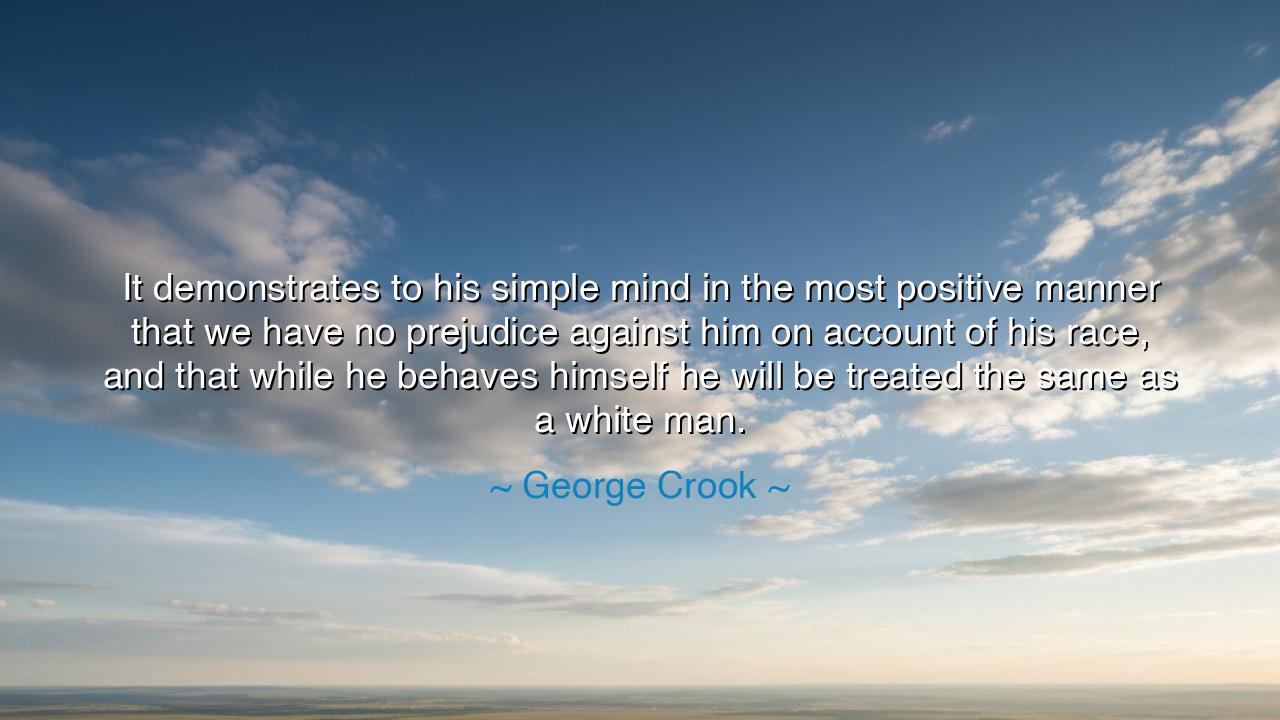
It demonstrates to his simple mind in the most positive manner
It demonstrates to his simple mind in the most positive manner that we have no prejudice against him on account of his race, and that while he behaves himself he will be treated the same as a white man.






The words of George Crook — “It demonstrates to his simple mind in the most positive manner that we have no prejudice against him on account of his race, and that while he behaves himself he will be treated the same as a white man.” — come to us from the tumultuous frontier days of America. Though his phrasing reflects the prejudices of his own age, the heart of his intent reveals a struggle familiar to all eras: how to reconcile justice with power, and equality with custom.
Crook, a U.S. Army officer who spent much of his life dealing with Native Americans, sought at times to treat them with a fairness uncommon among his contemporaries. Yet his words show the limitations of the mindset of his day — to describe another’s mind as “simple” was to betray the lingering superiority that so often poisoned relations between races. Still, his insistence that a man of another race ought to be treated as a white man if he lived peaceably was itself a radical notion in a time when many denied such possibility outright.
The struggle reflected in these words recalls earlier moments in history when those in power grappled with how to treat those they deemed “other.” In ancient Rome, conquered peoples were at first despised, but over time, citizenship was extended to Gauls, Spaniards, and others who had once been enemies. The empire learned, however reluctantly, that strength came not only from conquest, but from inclusion. Crook’s words echo this slow awakening: that the worth of a man is proven not by his origin, but by his conduct.
And yet, the very condition — “while he behaves himself” — reminds us of the incomplete nature of this justice. True equality does not rest upon conditional tolerance, but upon recognition of shared humanity. Crook’s statement, then, stands at a crossroads: part aspiration, part limitation, part glimpse of a better world still out of reach.
Let the generations remember: every step toward justice, even when flawed by the language of its time, is still a stone laid upon the road of progress. The words of George Crook show both the shadow of prejudice and the glimmer of fairness. They remind us that the struggle for equality is not born perfect, but grows slowly, as men and women push against the boundaries of their age, striving to see in one another not the divisions of race, but the unity of mankind.






TTTran Thanh Thao
It’s troubling to think about the 'benevolence' that some people believed they were offering in the past, as suggested by this quote. The emphasis on 'behavior' and 'simple minds' makes it clear that people were seen as lesser simply because of their race. This mentality reinforces harmful stereotypes. I’d like to know: what would it take for such a mindset to shift towards true racial equality where everyone is valued equally by default?
NLNhat Nhat Nhat Le
This statement highlights a particular moment in history where racial prejudice was often rationalized under the guise of 'civilizing' or 'educating.' It’s interesting to reflect on how the language used in this quote reflects the power dynamics of its time. However, I wonder how the speaker would view modern discussions of race and systemic inequality. Would their perspective have evolved, or would they still stand by these outdated views?
DHDao Huong
While this quote might have been seen as progressive in its time, it now feels patronizing and insufficient. The notion of treating someone 'the same as a white man' suggests an inherent difference between races that we should overcome. True equality isn't about treating someone based on behavior or race but about recognizing their inherent worth as an individual, regardless of their race or conduct.
MDLe Thi My Duyen
The quote seems to reveal an outdated, even problematic, perspective on race and equality. The phrase 'simple mind' is deeply condescending, and the idea that someone should be treated equally only if they 'behave themselves' raises red flags. How can we say we're treating someone equally when we imply they must conform to certain standards to receive that treatment? This statement reflects a certain racial hierarchy that’s difficult to ignore.